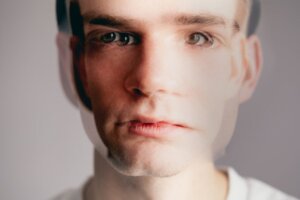Seven Clues to Help You Recognise a Dark Triad Personality


Written and verified by the psychologist Valeria Sabater
Would you be able to recognize a dark triad personality? As a matter of fact, most of us do indeed have a radar for detecting manipulators and liars. The kinds of people who can’t deal with frustration and who lack empathy. However, sometimes this kind of disturbing profile is behind both criminal acts and harmful behaviors such as workplace or sexual harassment.
Some define the dark triad as an entity that’s as dangerous as the Bermuda Triangle. Because whoever falls into this particular space is no longer the same as before. This clinical term, coined in 2002, defines a set of dangerous traits that everyone should know about. In fact, these kinds of people are insensitive beings capable of doing anything to achieve what they want.
Psychology and neuroscience have been trying to understand aggressive and unscrupulous behavior for decades. However, it wasn’t until a few decades ago that they introduced this theory. They discovered that a dark kind of personality exists and, although it might present itself in different people in varying degrees, they all make an impact in any social situation.
“Good people are rarely suspicious: they cannot imagine others doing the things they themselves are incapable of doing…”
-Robert Hare-

Learning to recognize the dark triad personality
In order to recognize the personality of the dark triad, you must bear in mind that it’s made up of three traits: narcissism, Machiavellianism, and psychopathy. It’s also important to note that this psychological reality only reveals subclinical signs. In other words, it doesn’t include real clinical conditions such as antisocial personality disorder or narcissistic disorder.
It was Delroy L. Paulhus and Kevin M. Williams who first coined this construct in 2002. The authors, like many other experts on the so-called dark personality, have a very specific opinion. They believe that this set of traits shapes a kind of profile about which we still have a lot to learn.
It’s important to know how to detect and identify these types of behaviors, so you can recognize them in your daily life. Let’s take a look at them.
1. Great tricksters, seducers, and snake charmers
Recognizing the dark triad personality usually takes some time. This is because these kinds of people are like snakes. They charm first, then bite. Indeed, they’re true chameleons, wolves in sheep’s clothing who know how to charm and integrate themselves into any situation.
They’re skilled at being successful at work, winning over people, and dazzling whoever they have in their sights.
2. Self-indulgent and arrogant
It’s quite possible that the characteristics of the dark triad personality type that most attract your attention will be those related to narcissism. For example, extremely arrogant men and women. Personalities who need attention, power, and self-indulgence in their apparently dazzling strengths and skills.
3. They possess powers of conviction
To recognize a dark triad personality, you need to look at those people skilled in the art of persuasion. They’re the kinds of people that could sell a glass of water to a drowning man. They make you believe that they know the truth and you’re wrong. In fact, it’s the Machiavellian trait that gives them that meticulous, cold, and shrewd cunning with which they achieve what they want.
4. No regrets and no conscience
As we’ve mentioned, the dark triad personality contains traits of psychopathy. The University of Nottingham conducted a study that suggested a lack of remorse and empathy was more significant in people with higher scores in Machiavellian and psychopathic traits.
In the latter cases, something concrete occurs. In fact, the darkest personalities act solely for instrumental purposes and to achieve what they want. They don’t hesitate to violate ethical and moral principles. Furthermore, in many cases, they may be aware that they’re inflicting harm, but they don’t care. In addition, they lack awareness when it comes to emotional connections.
5. How to recognize the fragile dark triad personality
The dark triad falls within a spectrum. Consequently, there’ll be individuals with more dangerous behaviors (the so-called dark personality), while others are included in the more fragile category. However, what do we mean when we talk about fragile dark personalities”?
- When a person scores higher on the narcissism trait, they show low self-esteem. This correlates with a greater need for attachment and recognition. They long to have people around them to serve as psychological reinforcers and validators. Without them, they’re nothing. Hence, they’re fragile.
However, the darker and more incisive profile presents higher self-esteem. Furthermore, they’re more calculating, less impulsive, and can function as the classic lone wolf for long periods, without the need to have anyone by their side.
It’s important to keep in mind that the dark triad manifests itself in many ways. Some of these people are dishonest and dangerous and oriented towards sadism and cruelty. Others adapt better to social norms. However, they’re always driven by hidden objectives and interests.
6. Moral and social disengagement
There’s another important factor in recognizing the dark triad personality. These kinds of people emphasize the fact that the world doesn’t conform to their personal standards. In fact, they perceive themselves as superior beings, figures that can’t adapt to social, legal, ethical, and even moral codes. They consider themselves to be above any structure, of any entity, or worse, of any person.
This approach is what justifies them to commit crimes and transgress any kinds of norms.

7. Erratic lifestyle
They don’t usually keep their jobs. They’re also not good at maintaining friendships and relationships, etc. In addition, they don’t support authority figures and it’s common for them to exhibit all kinds of problematic behaviors. In fact, many indulge in substance abuse, are extremely impulsive, and have the recurring tendency to take risks.
Their unusual tendencies are also significant in sexual matters. These people can be harassing, harbor violent sexual fantasies, and manifest inappropriate behaviors. However, these nuances don’t appear in 100 percent of the individuals defined by the dark triad construct. Nevertheless, it’s a remarkable trend that needs to be taken into account.
To conclude, if you think that someone close to you shows these characteristics, you must protect yourself. These people have minds that are oriented to only one aspect: self-gratification. Furthermore, as you’ve seen, their needs circumvent the permissible and even the moral. Keep it in mind.
Would you be able to recognize a dark triad personality? As a matter of fact, most of us do indeed have a radar for detecting manipulators and liars. The kinds of people who can’t deal with frustration and who lack empathy. However, sometimes this kind of disturbing profile is behind both criminal acts and harmful behaviors such as workplace or sexual harassment.
Some define the dark triad as an entity that’s as dangerous as the Bermuda Triangle. Because whoever falls into this particular space is no longer the same as before. This clinical term, coined in 2002, defines a set of dangerous traits that everyone should know about. In fact, these kinds of people are insensitive beings capable of doing anything to achieve what they want.
Psychology and neuroscience have been trying to understand aggressive and unscrupulous behavior for decades. However, it wasn’t until a few decades ago that they introduced this theory. They discovered that a dark kind of personality exists and, although it might present itself in different people in varying degrees, they all make an impact in any social situation.
“Good people are rarely suspicious: they cannot imagine others doing the things they themselves are incapable of doing…”
-Robert Hare-

Learning to recognize the dark triad personality
In order to recognize the personality of the dark triad, you must bear in mind that it’s made up of three traits: narcissism, Machiavellianism, and psychopathy. It’s also important to note that this psychological reality only reveals subclinical signs. In other words, it doesn’t include real clinical conditions such as antisocial personality disorder or narcissistic disorder.
It was Delroy L. Paulhus and Kevin M. Williams who first coined this construct in 2002. The authors, like many other experts on the so-called dark personality, have a very specific opinion. They believe that this set of traits shapes a kind of profile about which we still have a lot to learn.
It’s important to know how to detect and identify these types of behaviors, so you can recognize them in your daily life. Let’s take a look at them.
1. Great tricksters, seducers, and snake charmers
Recognizing the dark triad personality usually takes some time. This is because these kinds of people are like snakes. They charm first, then bite. Indeed, they’re true chameleons, wolves in sheep’s clothing who know how to charm and integrate themselves into any situation.
They’re skilled at being successful at work, winning over people, and dazzling whoever they have in their sights.
2. Self-indulgent and arrogant
It’s quite possible that the characteristics of the dark triad personality type that most attract your attention will be those related to narcissism. For example, extremely arrogant men and women. Personalities who need attention, power, and self-indulgence in their apparently dazzling strengths and skills.
3. They possess powers of conviction
To recognize a dark triad personality, you need to look at those people skilled in the art of persuasion. They’re the kinds of people that could sell a glass of water to a drowning man. They make you believe that they know the truth and you’re wrong. In fact, it’s the Machiavellian trait that gives them that meticulous, cold, and shrewd cunning with which they achieve what they want.
4. No regrets and no conscience
As we’ve mentioned, the dark triad personality contains traits of psychopathy. The University of Nottingham conducted a study that suggested a lack of remorse and empathy was more significant in people with higher scores in Machiavellian and psychopathic traits.
In the latter cases, something concrete occurs. In fact, the darkest personalities act solely for instrumental purposes and to achieve what they want. They don’t hesitate to violate ethical and moral principles. Furthermore, in many cases, they may be aware that they’re inflicting harm, but they don’t care. In addition, they lack awareness when it comes to emotional connections.
5. How to recognize the fragile dark triad personality
The dark triad falls within a spectrum. Consequently, there’ll be individuals with more dangerous behaviors (the so-called dark personality), while others are included in the more fragile category. However, what do we mean when we talk about fragile dark personalities”?
- When a person scores higher on the narcissism trait, they show low self-esteem. This correlates with a greater need for attachment and recognition. They long to have people around them to serve as psychological reinforcers and validators. Without them, they’re nothing. Hence, they’re fragile.
However, the darker and more incisive profile presents higher self-esteem. Furthermore, they’re more calculating, less impulsive, and can function as the classic lone wolf for long periods, without the need to have anyone by their side.
It’s important to keep in mind that the dark triad manifests itself in many ways. Some of these people are dishonest and dangerous and oriented towards sadism and cruelty. Others adapt better to social norms. However, they’re always driven by hidden objectives and interests.
6. Moral and social disengagement
There’s another important factor in recognizing the dark triad personality. These kinds of people emphasize the fact that the world doesn’t conform to their personal standards. In fact, they perceive themselves as superior beings, figures that can’t adapt to social, legal, ethical, and even moral codes. They consider themselves to be above any structure, of any entity, or worse, of any person.
This approach is what justifies them to commit crimes and transgress any kinds of norms.

7. Erratic lifestyle
They don’t usually keep their jobs. They’re also not good at maintaining friendships and relationships, etc. In addition, they don’t support authority figures and it’s common for them to exhibit all kinds of problematic behaviors. In fact, many indulge in substance abuse, are extremely impulsive, and have the recurring tendency to take risks.
Their unusual tendencies are also significant in sexual matters. These people can be harassing, harbor violent sexual fantasies, and manifest inappropriate behaviors. However, these nuances don’t appear in 100 percent of the individuals defined by the dark triad construct. Nevertheless, it’s a remarkable trend that needs to be taken into account.
To conclude, if you think that someone close to you shows these characteristics, you must protect yourself. These people have minds that are oriented to only one aspect: self-gratification. Furthermore, as you’ve seen, their needs circumvent the permissible and even the moral. Keep it in mind.
All cited sources were thoroughly reviewed by our team to ensure their quality, reliability, currency, and validity. The bibliography of this article was considered reliable and of academic or scientific accuracy.
- Gómez-Leal, R., Megías-Robles, A., Gutiérrez-Cobo, M. J., Cabello, R., Fernández-Abascal, E. G., & Fernández-Berrocal, P. (2019). Relationship between the Dark Triad and depressive symptoms. PeerJ, 7, e8120. https://doi.org/10.7717/peerj.8120
- Heym N, Firth J, Kibowski F, Sumich A, Egan V, Bloxsom CAJ. Empathy at the Heart of Darkness: Empathy Deficits That Bind the Dark Triad and Those That Mediate Indirect Relational Aggression. Front Psychiatry. 2019 Mar 12;10:95. doi: 10.3389/fpsyt.2019.00095. PMID: 30930800; PMCID: PMC6423894.
- Hudek-Knezevic, Jasna. (2016). Dark triad traits and health outcomes: An exploratory study. Psihologijske Teme.
- Xiao, M., Wang, Z., Kong, X., Ao, X., Song, J., & Zhang, P. (2021). Relatedness Need Satisfaction and the Dark Triad: The Role of Depression and Prevention Focus. Frontiers in psychology, 12, 677906. https://doi.org/10.3389/fpsyg.2021.677906
This text is provided for informational purposes only and does not replace consultation with a professional. If in doubt, consult your specialist.







